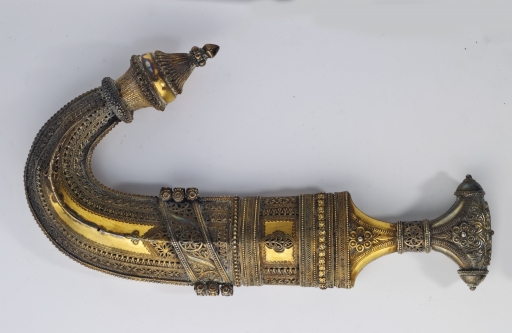Temporary export bans have been imposed on a dagger and traditional silk robes worn by Lawrence of Arabia in the hope of keeping them in the UK.
The items are at risk of going overseas unless a buyer can be found to match asking prices of £122,500 for the British First World War envoy’s dagger and £12,500 for his robes, the UK Government warns.
They were sold at auction last year.
Deferring export licences, Culture Minister Ed Vaizey said: “T.E. Lawrence was one of the most extraordinary figures of the 20th Century. These robes and dagger are absolutely iconic and a key part of his enduring image. It is important that these classic objects remain in the UK.”
The Government’s move follows a recommendation by a cultural review body.
Arab Revolt
Thomas Edward Lawrence, archaeologist, soldier and diplomat, was sent to the Middle East because of his knowledge of the region.
He campaigned with Arab leaders during their revolt against Ottoman rule, becoming among the best known individuals of the Great War.
Lawrence wears the white silk Arab robes, made in Mecca or Medina, in a celebrated 1919 oil portrait by Augustus John.
The steel and silver dagger was presented to him by Sherif Nasir in 1917 after the victory at Aqaba in Jordan, a scene featured in the 1962 Oscar-winning film Lawrence of Arabia.
Lawrence posed with both the curved dagger – called a jambiya – and the robes while sitting for the sculptor Lady Kathleen Scott, widow of Scott of the Antarctic, in 1921.
The Government decision to impose temporary export bans follows a recommendation by the Reviewing Committee on the Export of Works of Art and Objects of Cultural Interest (RCEWA), administered by Arts Council England.
Both sets of items are held to have a close association with British history and national life.
‘Extraordinary feat’
RCEWA Chairman Sir Hayden Phillips said: “Although the depiction, in the film Lawrence of Arabia, of Lawrence leading a sweeping camel charge across the desert into Aqaba in 1917 is probably a romantic exaggeration – stunning though it is – the taking of Aqaba from the landward side, with the help of Auda Abu Tayi, leader of the northern Howeitat, was an extraordinary feat and marked a crucial turning point in the campaign.
“The dagger was presented to Lawrence by Sherif Nasir in gratitude for Lawrence’s leadership and as a spontaneous mark of respect. The robes and dagger together form a crucial part of the images of Lawrence in painting, sculpture and photographs; and they are therefore an integral part of his life and our history.”
Decisions on the export licence applications for the items have been deferred until April 1st 2016. This may be extended for a further three months if serious moves are made to purchase them.
Source: UK Government (Department for Culture, Media & Sport – DCMS)
Images courtesy of DCMS
Posted by: CN Editorial Team
